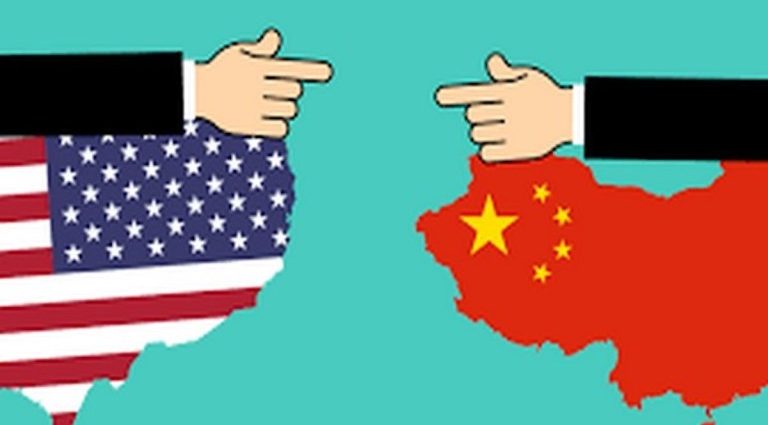The new leader of China’s State Council called Monday for strengthening trade relations between China and the United States, the world’s two largest economies – although American politicians are pushing forward a decoupling and his own boss, President Xi Jinping, had just vowed to confront enemies with a “steel Great Wall.”
“Some people in the US have recently launched publicity stunts about a decoupling between the US and China,” Premier Li Qiang, playing the good cop role, said in a media briefing after Monday’s closure of the annual meeting of the National People’s Congress. “Sometimes the publicity stunts are hot, but I don’t know how many people can really benefit from them.”
“The US and Chinese economies are highly integrated, and we both benefit from each other’s developments,” Li said.
He added that the China-US bilateral trade hit a record high last year while mainland-based foreign corporate executives remained positive about China’s prospects.
“All these have shown that the US and China can and should work together,” he said. “There is room for China-US cooperation while containment and suppression are no good to anyone.”
Steel Great Wall
At the nine-day NPC annual meeting, where Xi Jinping successfully renewed his presidential term for five more years while Li became the new chief of the State Council, Xi continued to play his bad cop role.
While Li will avoid highlighting China-US conflicts as his role is to attract foreign investments, commentators said, Xi will continue to emphasise China’s national security needs.
“The external environment has drastically changed in recent years, resulting in a significant increase in uncertainties,” Xi said in a meeting with a group of Chinese businessmen on March 6. “Western countries, led by the US, have implemented all-round containment, encirclement and suppression against us, bringing unprecedentedly severe challenges to our country’s development.”

In a speech at the closing ceremony of the NPC annual meeting, Xi also commented on external challenges.
“It is necessary to comprehensively promote the modernization of national defense and the army, and build the people’s army into a steel Great Wall that effectively safeguards national sovereignty, security, and development interests,” Xi said.
He said China will improve its national security system and public security governance to fulfil the needs of the country’s new security pattern. He added that security is the foundation of economic development, while stability is the prerequisite for prosperity.
US-China political tensions have increased since US President Joe Biden ordered the shoot-down of a Chinese “spy balloon” flying over US airspace on February 4.
On February 28, the US House Committee on Foreign Affairs and the US House Financial Services Committee proposed more than a dozen bills that call for supporting Taiwan and sanctioning China.
One country, two systems
While Li and Xi talked differently about the US-China relations, they both reiterated the central government’s policy of implementing “one country, two systems” in Hong Kong and Macau.

“With the central government’s support, Hong Kong maintains its status as an international financial, trading and logistic hub while Macau is still an international tourism center,” Li said. “Although Hong Kong and Macau have faced some challenges in their developments in recent years, these are only temporary problems.”
Li said the central government will further integrate Hong Kong and Macau into China’s economic development plan.
Xi said China’s development plan cannot be implemented without the long-term stability in Hong Kong and Macau. He said Beijing is determined to implement the “one country, two systems” principle in both cities and oppose the Taiwan independence forces.
Lau Siu-kai, an advisor of the Chinese Association of Hong Kong and Macau Studies, said Hong Kong’s “one country, two systems” can be a showcase for Taiwan if mainland China and the island are going to reunify.
However, Taipei has said that it will not accept the “one country, two systems” model.
US-China economic relations
Here are the latest statistics that bear on any analysis of cooperation versus decoupling:
According to the US Census Bureau, US exports to China grew 1.6% to US$153.8 billion last year from 2021. US imports from China increased 6.4% to US$536.8 billion in 2022, almost returning to the pre-trade war level of US$538.5 billion in 2018.
The US trade deficit with China rose by 8.3% to US$382.9 billion last year from 2021.
Last year, the US exported US$30.1 billion of agricultural products to China, up 19.7% year-on-year. It also shipped US$25.7 billion of chemicals (+22.4%) and US$11 billion of oil and gas (-12.1%) to China.
Chinese goods imported by the US included computer and electronic products (30%), manufacturing goods (11%) and electrical equipment and appliances (10.4%). The US goods shipped to China included agricultural products (19.5%), chemicals (16.7%) and oil and gas (7.2%).
Although the US Commerce Department’s Bureau of Industry and Security (BIS) has added hundreds of Chinese firms to its “entity list” for possible sanctions, only about 1% of the US exports to China were subject to BIS license requirements in 2021. The percentage for 2022 has not been published but it’s likely that it will be around the same level.
Undersecretary of Commerce for Industry and Security Alan Estevez said last month that the US Commerce Department and other government agencies approved about 70% of export license applications involving China last year.
On February 28, US House Foreign Affairs Committee Chairman Michael McCaul expressed concern that the BIS continues to allow critical US technology to be sold to China, including through licenses reportedly worth US$60 billion to telecom giant Huawei Technologies and $40 billion to chip maker SMIC.
Read: Open season on China in Taiwan-focused US House
Follow Jeff Pao on Twitter at @jeffpao3

